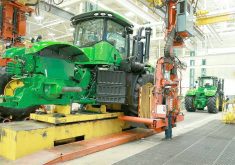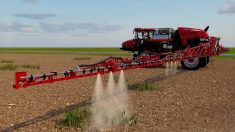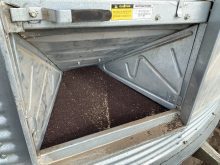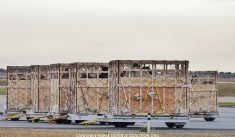It has been a couple of unusually busy months in regard to issues that affect producers and landowners in Alberta.
I expect that many are somewhat relieved that some of these long-standing concerns are being resolved. But then resolution is in the eyes of those affected and it s not always positive or sincere.
The Canadian Wheat Board is devolving, or going down fighting (depending on one s perspective), but then its demise was promised by the federal Conservative government. Considering the termination of the CWB has been Alberta government policy for the past 20 years, there was some inevitability to the process one way or another. The recent reunion in Lethbridge of the growers who went to jail for taking wheat across the border, brings back memories of how their long-ago send-off to jail was attended by former premier Ralph Klein and 600 supporters who vowed to continue the battle. But the battle continues; recent news about lawsuits would indicate that lawyers will be the first beneficiaries, and taxpayers the first losers of the proposed restructuring of the CWB.
Read Also

Farm equipment sales sector sees significant structural changes
Farming equipment sales have been declining for a number of years now, and one industry professional believes structural changes in the industry are needed to curb that trend.
Another issue that has come back in the public eye is the demise of the long-gun registry. It has been an emotional issue in rural Alberta since the concept was first raised. The city media played the issue up as an urban/rural cultural split. That was somewhat contrived because if you didn t own a firearm, registering or even banning them was no big deal. The real issue with owners was the insane cost and mindless paperwork. Using the provincial vehicle licensing system, a grandfathering process and financial incentives would have been the better approach actual registration was never the issue. Yet today we have the federal government not only killing the registry, but destroying all evidence of it ever existing. It would seem common sense was never a danger with this issue.
At the provincial government level, we see our newly minted premier exercising her newly acquired power by issuing directives on diverse issues, including ones affecting landowners and the future of food production in this province.
One directive suspended the development of two massive electricity transmission lines involving hundreds of millions of dollars and thousands of acres. It would seem to be a result of the fallout from Bill 50, one of the contentious land-use acts. The development is to be subject to some sort of review before it is allowed to proceed. For affected landowners, the issue has more to do with honesty about who really benefits, who pays, and some fair and realistic compensation for expropriation. The role of power exports to the U.S. and more subsidies for the already subsidized wind power industry that are hidden in transmission line projects scream for clarification and honesty.
The new premier also issued a directive to kill the proposed sale of 6,500 hectares of crown grazing land for development into irrigated cropland. Granted the previous PC administration bungled the original sale, but stopping this revised sale proposal sends a chilling message to government range and land managers. I expect that to protect their jobs, that there will now be no further land sales for agricultural uses anywhere in the province. That s too bad because with an increasing world population we need to develop more land for food production, particularly high-production irrigated land. I also expect that water licence and grazing lease transfers will now come under increasing scrutiny and delay. The urban-based green and wildlife lobbies won that round.
One directive that hasn t yet come from the premier but should be expected involves bringing farm workers under mandatory OHS regulations and compulsory WCB. The premier stated during her leadership campaign that she would take that action when elected. That s actually a much-needed step as Alberta is the only remaining province not to include those workers under those regulations.
Hopefully that anticipated directive will not be as arbitrary as some of the others the premier has sent out and will take a more thoughtful common-sense approach. In case the premier is contemplating such a directive, here is some additional food for thought: To ease the burden, OHS and WCB should be phased in, starting with agricultural operations that have 10 or more employees. Then the scope needs to be broadened to include owners and working-age children of small operations, where loss or injury is much more devastating and can even result in the complete loss or bankruptcy of the whole operation. Then the directive also needs to address OHS regulations for Hutterite colonies. Notwithstanding all that advice, the previous Stelmach administration agreed with the ag industry not to extend OHS to farm workers. I guess it should be an interesting directive.
———
Incasethepremieris
contemplatingsuchadirectivehereissomeadditionalfoodforthought.














